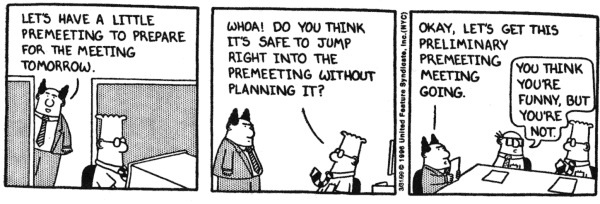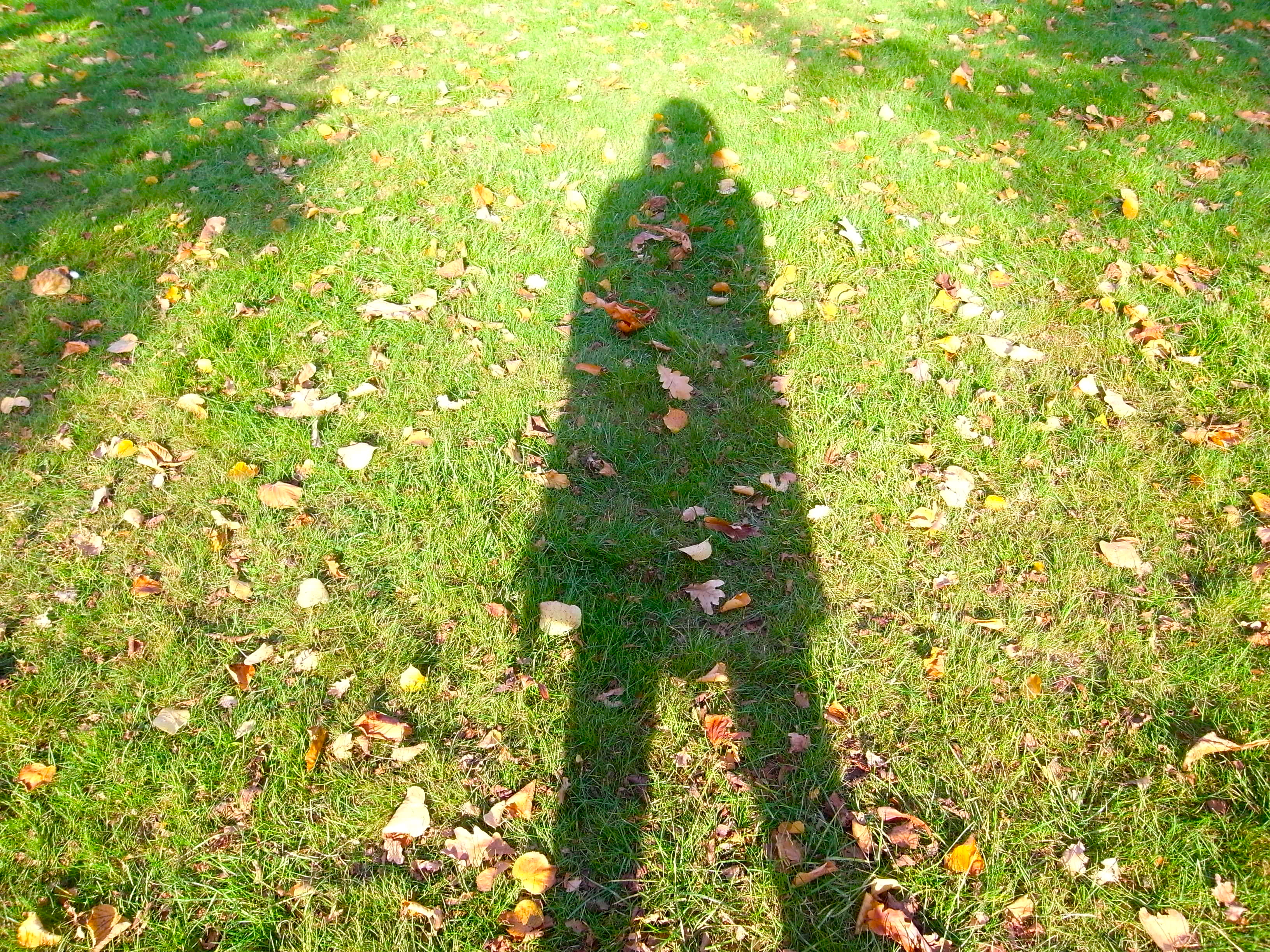The sabbatical is over and after almost a month back at work I don’t think I’m yet fully readjusted. And I’m not so sure I want to be… Is it possible to keep some of my sabbatical habits and still do a good job?
I knew coming back to work wasn’t going to be easy, and that has been confirmed, although for different reasons than the ones I expected. If I put aside all the typical hassles associated with the act of working: waking up earlier than what your body wants, taking public transport at the worst hour of the day, having to dress formally when all you want to wear is jeans, conforming to bad coffee at the local canteen, etc; I confess I actually missed working. I missed the real meaning of it: “the act of producing or accomplishing something with your skills or talents”. I’ve even found it rewarding after so many months away. The hardest part hasn’t been the work itself, but all the rest we call work that actually is not work. And the big winner of this category is Meetings.
The concept of meetings is something I learned and embraced from the first day of my working life. If you work at an office, any office, you do meetings, lots of them. Actually I believe meetings have occupied most of the time of my employed life, at every level in my career. And the more I grew in the organization the more meetings I would have.
I remember my very first day at work, feeling really proud when invited to my first one. “Now I’m a respectable adult, now I do meetings”. And this unconditional respect for meetings is a popular phenomenon. If my mother calls me and I say “I’m in a meeting” she would immediately hang up apologizing for disturbing me, while if I say “I’m at my desk” she will start talking non stop assuming I’m basically doing nothing.
Meetings seem to carry an aura of status, of something important, significant, even if it has no subject. So most of office-working-people want to be part of them. They belong to the established working life and we tend to accept them as they come, even if you don’t say a word throughout, leave them without understanding what was discussed, or what was concluded. If you do meetings, you exist.
But are we really working when we are at meetings? Maybe they are just a necessary evil when you work in a big company, with lots of people who need to be engaged or involved. Better just accept them and end of story.
Hmmm… can I challenge that?
With my hopefully still fresh mind, I’m trying to be more conscious about my everyday choices and avoid dedicating time and effort to matters that, in the end, don’t really matter. To do so, and for my own amusement, whenever I’m faced with a situation and I’m doubtful whether it’s something meaningful or simply a waste of life, I apply what I call ‘the Martian question.’ And no, it has nothing to do with Matt Damon or that predictable movie.
I use ‘the Martian question’ to inquire about a situation or concept to understand its true meaning, as if I had to explain it to a Martian, in the hypothetical event that a Martian would suddenly pop in and ask me about it. The whole point being that if I can’t explain the function of something in a way that a random Martian could easily understand, (assuming of course I speak Martianese or he/she/it speaks a language I can speak, and we engage in a friendly conversation about this, amongst many other things… in a Hollywood movie he/she/it would definitely speak English and all this would happen in Manhattan) then maybe there is something that’s not quite right with the concept. So in this case, I would ask myself, “How do I explain the concept of meetings to a Martian?”
The definition of meeting in the Oxford Dictionary is, “an assembly of people for a particular purpose, especially for formal discussion. But I don’t think that’s clear enough for a Martian. I will also have to explain that usually it takes place in a room with more than two people, a table, chairs and artificial light. There are also variations such as conference calls when people talk to a phone that is placed in the middle of the table. They could also be held as a just a step towards a future meeting, the famous pre-meetings. Some of them have also the incredible ability to unfold more meetings, like Gremilins fed after midnight.

So far so good, the problem would be in trying to explain to the extraterrestrial why we have so many of them, what we actually accomplish in most of them, why people are so tired after a full day of them, and why the more we have them the more we feel like we haven’t worked at all, and end up having to arrive earlier or leaving later to actually produce something.
But let’s be fair, not all of them are bad. There are great ones, inspiring ones which provide a space to exchange ideas that could only happen because of the people there. But unfortunately those are the exception. Somehow, even when all individuals attending a specific meeting are incredible, creative, collaborative people, something happens in the setting of most meetings where the sum of parts is not greater than the whole.
Aware of the of the risk of being devoured by meetings that could drain my energy and leave me with that feeling of lack of accomplishment that I experienced in the past, I decided to set up two new practices in my post sabbatical working life. The first one is so basic that I feel almost ashamed to share it: before accepting a meeting I ask what is the objective of that meeting and why I’m needed in it. The second one is to block one day a week in my calendar where I have absolutely no meetings, zero, nada.
So far both practices are going well. I also have realized that my “no meetings day” is not only my most productive day of the week but also the day I go home less tired than a normal meetings’ day. Everything has been fine with my new practices, but something happened last week that gave me new hope.
As one of my volunteering initiatives I joined a group formed after attending an online course about the Theory U: the U.Lab group. The objective of this group is to apply the principles of the Theory U to develop something meaningful, something I will probably share more on another post in the future… The Theory U proposes that “the quality of the results that we create in any kind of social system is a function of the quality of awareness, attention, or consciousness that the participants in the system operate from”. This means that in order to produce the desired results, any initiative has to start with the participants’ will to be present, to be fully there. And this is what I practiced last week with my U.Lab colleagues that made me completely revisit my preconceptions on meetings.
It was one of those days loaded with meetings, and I was feeling totally drained. Deep down all I wanted to do was go home and watch some brainless TV…. In fact, I almost didn’t show up, but the meeting would be happening literally 5 mins from my place and admittedly I was rather curious about this session I was attending for the first time.
The setting was the same as any of my meetings: table, chairs and artificial light. “Oh my God, another meeting”. I sat, looked at my watch thinking I still have two more hours to go, when the facilitator asked us to close our eyes and do ten minutes of meditation before getting started. “What?!”. Yes, meditation. There, in that room, with those people I barely knew. I was aware that one of Theory U’s main pillars is mindfulness but I never had experienced it myself before in that context. And after a full day of work meetings that particular request felt so weird, so uneasy, but at the same time so right… Still puzzled by that invitation I nevertheless followed the instructions, the breathing, the thoughts, all that, and ten minutes later I opened my eyes to experience a completely different kind of meeting.
It was 6:30pm after a tiring day but suddenly I felt re-energized again. I felt as though my sight and hearing had improved. I wasn’t that impatient animal that I usually become when I’m tired. I could express myself better and was keen to really listen to others. And the result was striking. The exchange of ideas and true collaboration led us to an outcome of possibilities I could never have imagined before, specially amongst a group of people that didn’t really know each other.

I always thought this “being present” thing was something kind of obvious and easy, but no, it isn’t. Unfortunately many of us have been wired with the idea that we need to be someone else at work. That being us, with everything that entails, is not good. So we create work characters believing otherwise we won’t succeed. And we end up living “happily” with that concept, believing that’s Ok, because work is work and it doesn’t have to reflect who we really are. How many times have I heard, “That person is really nice outside work”. Or ,”He/she is really difficult at work but in his/her personal life is actually very friendly”.
Isn’t it sad to leave the best of us outside environments that could have the potential to collectively produce amazing results?
So where do I stand now on the subject of meetings? Will I propose to start with a meditation in my next meeting? I don’t know. I’d like to… But I can say that the experience I had last week led me to revisit the role of meetings and their possibilities. I realized the problem is not the meeting itself, but how we treat them, what we make of them and why we accept that they invade our lives without questioning their full potential. They can be a source of collaboration, co-creation, of something great, something unimaginable with the combination of different talents and skills. But in order for that to happen we need to start with ourselves, leaving behind our work characters. We need to be willing to enter those rooms without the fear of being who we really are, embracing the most vulnerable and creative versions of ourselves.
Only then will meetings stop being the work that is not actually work, or an instance that drains our energy as we get tired of acting out the work characters from a bad script.
At least now I feel I may have a better answer to the Martian about what meetings are, or what they could be… I feel more hopeful not only because I don’t want to be caught off guard when aliens visit Earth, and interrogate humans about their contribution to the universe, but also because I’m committed to be more conscious about how I dedicate my time on the matters I can control. And in this sense I think I learned that there is no good meeting without meeting myself first.
